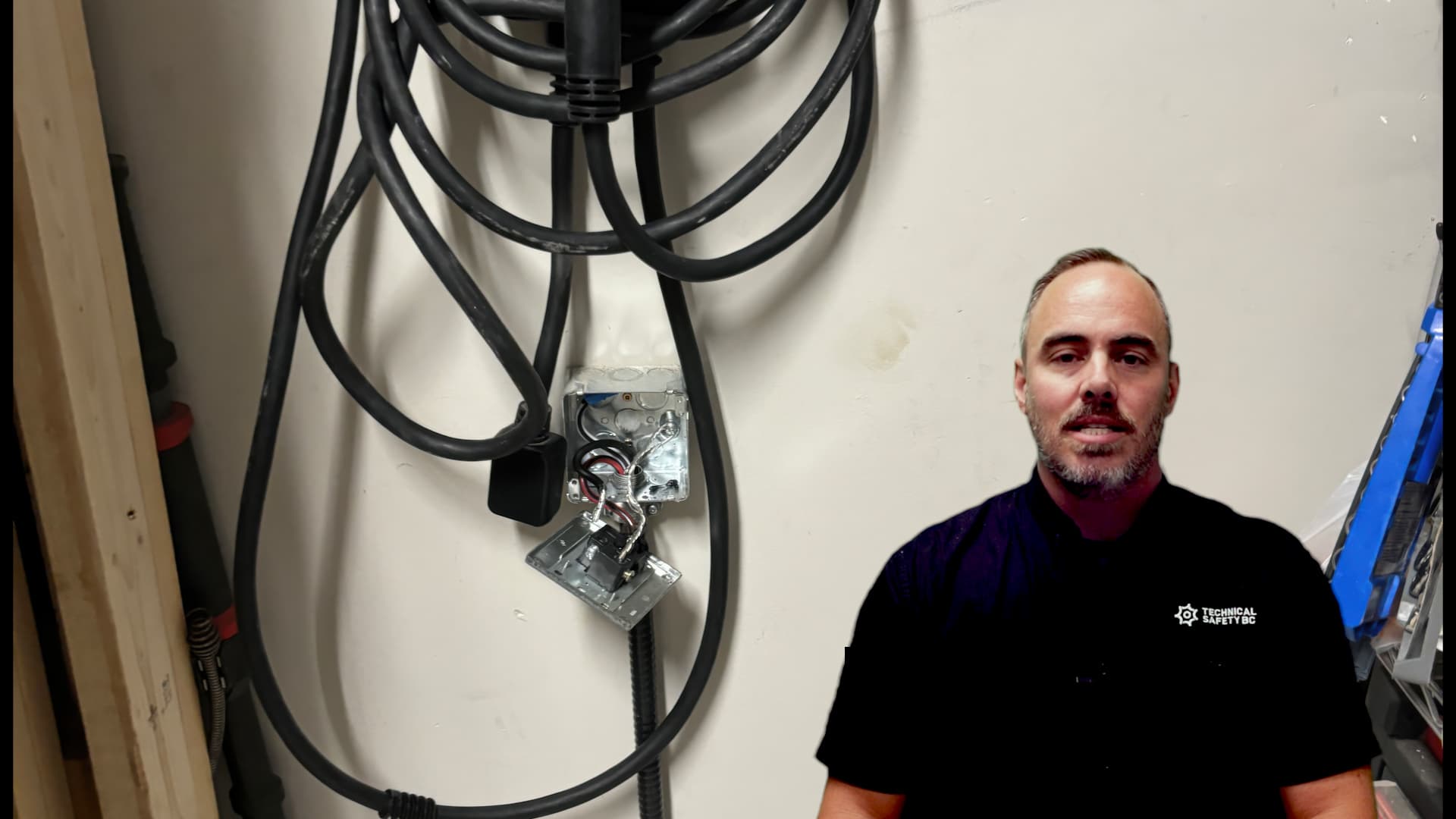Electric Vehicle (EV) Charger Installation
Installation Permits
Overview
Installing an electric vehicle (EV) charger without a permit puts your vehicle, home, building, and property at risk. Before you install your charger, make sure you have the correct electrical installation permit and hire a licensed contractor. A permit is not only required for most installations, but also confirms the work is performed to code, reducing the risk of fire, electrical faults, or property damage.
The Value of an EV Charger Permits
Regulated work performed by a licensed contractor follows the safety guidelines set out in the Safety Standards Act and is subject to inspections which help catch issues before they become hazards. Hiring a licensed contractor and pulling an electrical installation permit can significantly lower the likelihood of a safety incident occurring involving your charger.
For shared spaces (like strata buildings), safe installation helps protect every resident in the building and avoids potential liability for building managers or councils. Some rebate programs require a valid permit to qualify for financial incentives. Rebates from BC Hydro, FortisBC, and CleanBC can potentially save you hundreds or thousands of dollars — but only if the installation is permitted. Pulling a permit also ensures eligibility documentation is in place for current or future funding opportunities.
Applying For A Permit
Contractors should apply and pay for a permit through their Online Services account or by using this form.
Strata & Building Manager EV Charging Resources
Thinking about upgrading your building’s electrical service to support additions like EV chargers? These resources walk you through what strata councils and property managers need to know, from permitting and circuit requirements to full-service upgrades.Installing EV Chargers in Multi-Unit Buildings: What Strata and Property Managers Should Know
This guide breaks down the permits, planning steps, and compliance checks needed for a safe, legal EV charger installation in your building.
Dedicated Circuit Requirements for EV Chargers in Multi-Unit Buildings
Not all chargers are plug-and-play. Learn why dedicated circuits are important and legally required, for safe, code-compliant EV charging.

Incident Investigation
Improperly Installed EV Charger Causes Overheating in Residential Garage
Non-Compliance
Permits are legally required for EV charger installations in BC. Installation without a permit is considered non-compliant and may lead to enforcement action or issues with home insurance.
Load Calculation for Multi-Family Dwellings
For installations in multi-family dwellings, we require the contractor to submit an accurate load calculation to ensure that the added electrical load created by EV chargers and management systems complies with the BC Electrical Code.
Because multi-family buildings have highly variable loads and usage patterns across units, accurate load calculation can be more complex than for a single-family dwelling.
While we recommend hiring a professional engineer to support your load calculations, contractors who are applying for an EV charger installation permit for a multi-family dwelling must follow the steps outlined below:
- An FSR must assess all loads across each unit and in common areas
- The FSR should perform a load calculation in accordance with Section 8 of the BC Electrical code.
We recommend that the FSR obtain the utility data, confirm the building loads and occupancy over a 12-month period, and then provide this information to an engineer who will review and submit under a variance.
Once we have received a load calculation in your permit application, an electrical safety officer will evaluate it.
Definitions from the BC Electrical Code and Product Standards
Electric Vehicle Supply Equipment (EVSE)
A complete assembly consisting of cables, connectors, devices, apparatus, and fittings installed for the purpose of power transfer and information exchange between the branch circuit and the electric vehicle.
Electric Vehicle Energy Management System (EVEMS)
A means used to control electric vehicle supply equipment loads through the process of connecting, disconnecting, increasing, or reducing electric power to the loads.
EV Charger Types
Level 1 Charger
This type uses a connection to a standard 120V outlet and is the slowest method of charging. It usually takes about 12 to 20 hours to fully charge a battery.
Level 2 Charger
This type uses a connection to a 240V outlet, which are typically used for powering ovens and clothes dryers. This type usually takes 6 to 14 hours to fully charge a battery.
Level 3 Charger
This type uses a direct current connection to an electrical system and is found mostly in businesses and public charging sites.
Electrical Operating Permit vs Electrical Installation Permit
In general, all EV charger installations will require an electrical installation permit.
If there is an existing electrical operating permit, however, an electrical installation permit may not be required, unless the EVSE exceeds:
- 12.5 kVA increase (for installations ≤250 kVA),
- Or 36 kVA increase (for installations >250 kVA).
EV charger installations may also require an electrical operating permit when it causes the connected load of the system to cross the 250 kVA threshold.
For more information about regulatory requirements related to EVSE and EVEMS and load calculations, read this information bulletin.
Related Information
Electric Vehicle Charger Safety
We asked one of our electrical safety officers to answer a few commonly asked questions about electric vehicle charging safety and installations.
Learn MoreImproperly Installed EV Charger Causes Damage in Residential Garage
An EV charger was installed incorrectly by an electrical contractor without the required permit.
Learn MoreEV Supply Equipment and EV Energy Management Systems
Requirements for Electric Vehicle Supply Equipment (EVSE) and Electric Vehicle Energy Management Systems (EVEMS).
Learn More